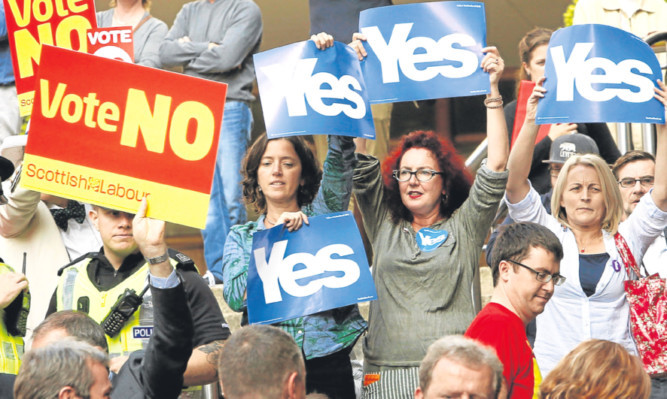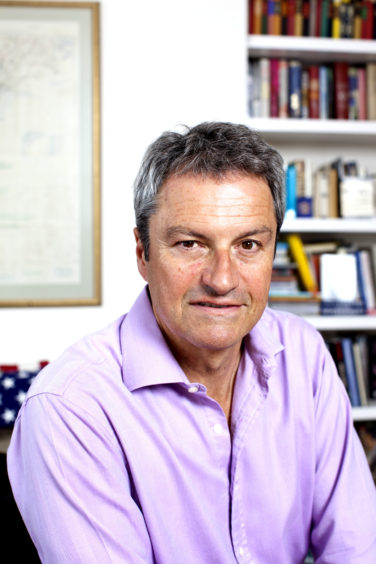
A new constitutional framework will be needed to glue together the increasingly divergent nations of the UK, according to Gavin Esler.
The broadcaster’s new book, How Britain Ends, suggests the forces straining the Union are in motion in all four countries, not just Scotland.
He believes the solution does lie in some form of reinvention and points to the constitutional reset achieved in the wake of Irish independence in 1922, and periodically before then.
“Every 100 years we have thought, as a result of a crisis, how we should reinvent ourselves. So it is possible,” he said.
His solution is much greater federalism and, within England, a devolution of powers to regional authorities.
“I suggest federalism is one obvious thing that has not happened. The second thing I would do is recognise that great English cities, like Birmingham, Leeds, Manchester and Newcastle used to run themselves – local government in England used to be really strong and it used to make politicians – I am talking about the 19th Century – like the Chamberlain family would run Birmingham, do well there and end up running the country, whereas now we have the system where people who are actually not very good at things end up rising to cabinet level.
“So a strong devolution in England might help solve many of these problems.
“Either there will be a move to reform or alternatively – let me quote George Osborne, who said the only way to stop Scotland voting for independence was not to let them vote on it. Well if that’s the unionist case its not a very good one. And these things can unravel quite quickly.”
Esler says it is English resentment, rather than that of its Scottish, Irish or Welsh counterparts, which has driven British politics over the past decade, and which now threatens to destroy the Union.
The roots of resentment lie in the devolution deals of 1999, which gave the Celtic nations, but not the English, their own parliaments, and an unease with being part of the European Union. Esler says: “When English people vote, they recognise Scots and Welsh and to an extent Northern Ireland, people there have something they haven’t, a much greater sense of local democracy.”
In England in recent years, the voters who lost out most under this system, Esler says, were these new nationalists – creating a sense of grievance against the UK system.
“In 2015 Ukip got 3.8 million votes and got one seat which was Douglas Carswell who then quit the party, so they got nothing. So 3.8 million people, mostly in England, didn’t get anything.
“And surveys have suggested there is a growing sense of English identity as opposed to British identity. That’s fine, but that sense, given that England is 84% of the population, is bound to change things.”
Esler says English nationalism’s real threat to the UK has only become apparent through Brexit, and through the actions of a government which has put its own interests ahead of the UK’s.
He says: “Its not British nationalism and its not seen as being UK-wide, so for example if Boris Johnson really were a member of the Conservative & Unionist Party as it used to be called, he would not have agreed to put the border in the Irish sea and throw 100 years of Ulster unionism into the sea. And if Boris Johnson really were a unionist, he would not have said that devolution for Scotland is a complete disaster, and he wouldn’t have agreed to a very aggressive form of Brexit which is something that Scots most certainly did not vote for.”
Esler, who was born in Glasgow and educated in Edinburgh, lives in England. He also stood for the Change UK Party at the European Parliamentary elections, calling for a “People’s Vote” to stop Brexit.
He wrote How Britain Ends for two reasons: “I wrote it as a challenge to Conservatives – What does it mean to be British anymore? For 400 years it meant Protestantism, empire, and war.
And since the end of the Cold War we haven’t really had that kind of glue any more. We have reinvented ourselves every hundred years, do we need to reinvent ourselves now? And it was also a challenge to nationalists to say how can you be independent when we are all living on the same islands and all clearly joined up?”
How Britain Ends. English Nationalism And The Rebirth Of Four Nations, by Gavin Esler, is published by Head Of Zeus

Enjoy the convenience of having The Sunday Post delivered as a digital ePaper straight to your smartphone, tablet or computer.
Subscribe for only £5.49 a month and enjoy all the benefits of the printed paper as a digital replica.
Subscribe © Shutterstock
© Shutterstock